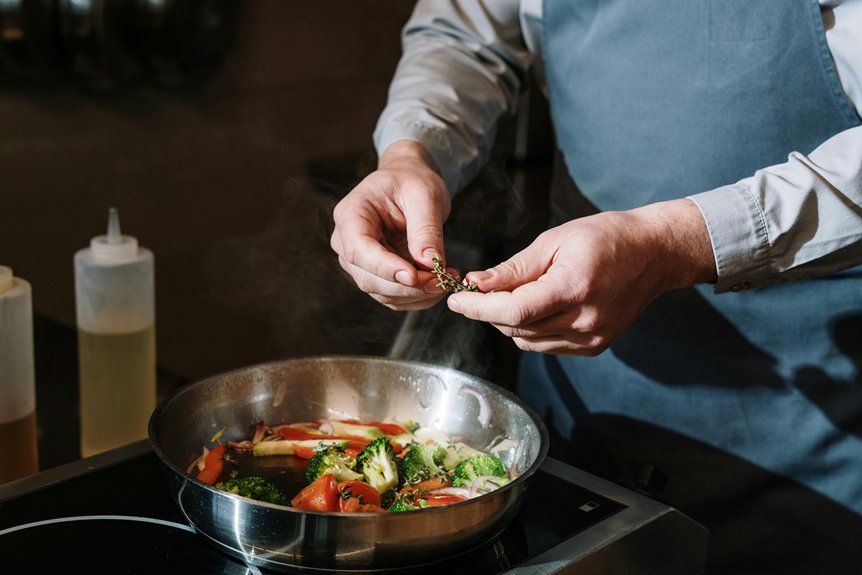
Did you know that around 40% of home cooks avoid using olive oil with their cast iron skillets due to misconceptions about damaging the seasoning? However, using high-quality extra virgin olive oil can actually enhance your skillet’s non-stick properties and flavor. The key lies in understanding how to use it correctly. So, what’s the right approach to incorporating olive oil without compromising that well-earned seasoning? Let’s explore this further.
Understanding Cast Iron Seasoning
When it comes to maintaining your cast iron skillet, understanding seasoning is essential for achieving the best cooking results. Seasoning isn’t just for flavor; it creates a non-stick surface and protects against rust. To season your skillet, start by cleaning it thoroughly, removing any old seasoning. Then, apply a thin layer of oil—flaxseed, vegetable, or canola work well—making sure you cover every inch. Heat your skillet upside down in the oven to allow the oil to polymerize, forming a durable coating. Regular use and proper care will enhance this layer, ensuring your skillet performs beautifully over time. Embrace this liberating process, and you’ll enjoy the freedom of cooking with a well-seasoned, reliable cast iron companion. Additionally, using high-quality oils like Gundry MD Olive Oil can contribute to the enhancements in antioxidant content that benefit your overall health while cooking.
The Role of Olive Oil in Cooking
Olive oil is a versatile staple in many kitchens, prized not just for its rich flavor but also for its numerous health benefits. When you cook with olive oil, you’re adding a depth of taste that enhances everything from sautéed vegetables to grilled meats. Its monounsaturated fats are heart-healthy, making it a guilt-free choice for drizzling, frying, or baking. Plus, olive oil’s antioxidant properties can help combat inflammation, contributing to overall well-being. You’ll find it perfect for low to medium-heat cooking, allowing you to infuse dishes with its distinct aroma. By incorporating olive oil into your meals, you not only elevate your culinary creations but also embrace a healthier lifestyle, liberating your palate and nourishing your body.
Myths About Olive Oil and Cast Iron
While many cooks swear by certain oils for seasoning cast iron, myths about using olive oil persist. One common misconception is that olive oil can’t withstand high heat. In reality, extra virgin olive oil has a smoke point around 375°F, making it suitable for many cooking methods, including frying. Another myth suggests olive oil will ruin your skillet’s seasoning. However, when used properly, it can enhance the seasoning layer rather than damage it. Some believe olive oil has too strong a flavor for cast iron, but its versatility means it can complement a wide range of dishes. By debunking these myths, you can confidently incorporate olive oil into your cast iron cooking routine without fear.
Tips for Using Olive Oil on Cast Iron
Incorporating olive oil into your cast iron cooking routine can be a game changer when you know how to use it effectively. Start by choosing a high-quality extra virgin olive oil, as its flavor and smoke point are ideal for most dishes. When preheating your skillet, use a small amount to coat the surface evenly; this helps create a non-stick barrier. Avoid excessive oil, as too much can lead to a greasy residue. If you’re cooking at high temperatures, consider mixing olive oil with another oil that has a higher smoke point, like avocado oil. Finally, always clean your skillet gently after use, ensuring you maintain its natural patina while enjoying the benefits of olive oil. Happy cooking!
Maintaining Your Cast Iron Skillet’s Seasoning
To keep your cast iron skillet’s seasoning in top shape, you need to adopt a few simple yet effective practices. First, always clean your skillet after use with hot water and a stiff brush—avoid soap! Dry it thoroughly to prevent rust. Next, apply a light layer of oil, like olive oil, to maintain that beautiful seasoning. Store your skillet in a dry place and consider placing a paper towel inside to absorb moisture. When cooking, use moderate heat to protect the seasoning from damage. Finally, if you notice wear, don’t hesitate to re-season your skillet. Embrace these steps, and your cast iron skillet will serve you well, bringing flavor and joy to your kitchen for years to come!





